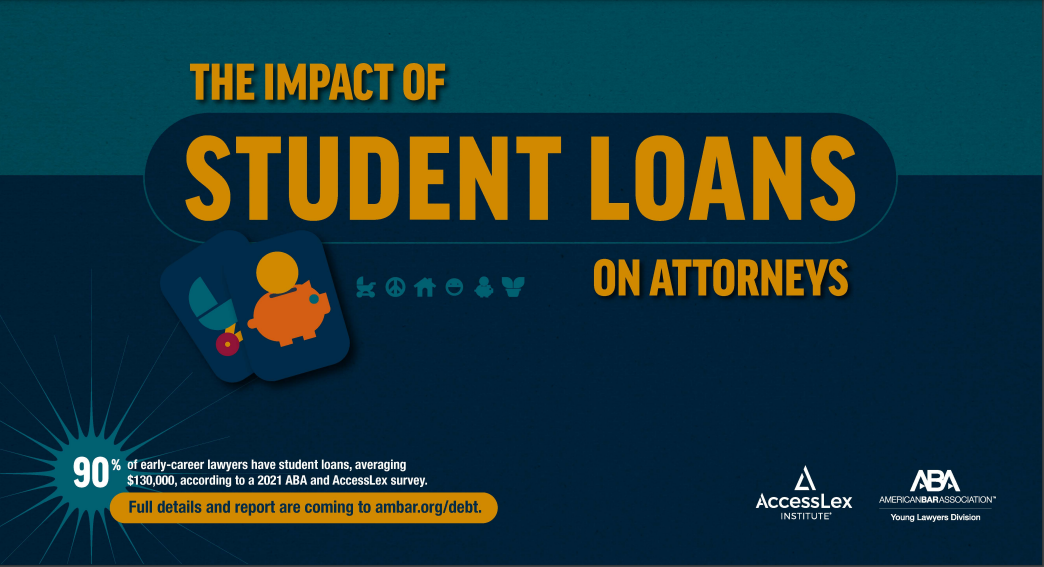
A recent report by the American Bar Association Young Lawyers Division and AccessLex Institute shows student loan debt is common and burdensome for young lawyers -- about 90 percent of those surveyed said their debt impacted their advancement toward major life milestones, and a majority of borrowers said they are anxious, stressed, regretful or guilty due to their loan debt.
As a result, the ABA is calling on federal policy makers to take action to relieve the burden of student loan debt for lawyers -- most of which comes from attending law school -- during its Student Debt Week of Action happening throughout this week.
“I postponed a lot of things for a couple of years -- taking any type of vacations I wanted to take and putting aside buying a house -- because I had a little over $200,000 in debt myself when I graduated from law school,” said Choi Portis, chair of the ABA Young Lawyers Division. “It’s definitely an issue and something that needs to be addressed on a national scale.”
Most Popular
The report describes the results of a survey administered by the ABA in April and May of 2021 to ABA members age 36 or younger and who graduated law school or were licensed within the last 10 years.
About 90 percent of the survey’s respondents said they took out student loans to finance their undergraduate or legal education, with an average law school debt of around $108,000 and a total amount of debt of $130,000. Black respondents were more likely to report law school debt of over $200,000, while Hispanic or Latinx and Indigenous respondents said they tended to borrow less for their law degree.
Young Black lawyers, saddled with the most debt, also reported having the most difficulty with reducing their debt balance. While 27 percent of the total respondents said they had higher debt amounts than when they graduated and 15 percent said their balance was the same, 44 percent of Black respondents said they had more debt than when they graduated and 21 percent said they had the same amount.
“The debt picture looks very different depending on the type of law graduates you’re talking about,” said Tiffane Cochran, director of research at AccessLex and co-author of the report, during a panel discussion held about the report Tuesday.
Additionally, Asian respondents and those with more than $100,000 of law school debt at graduation were more likely to say that they had postponed or decided not to buy a house or have children due to their amount of debt. Hispanic, Indigenous and multiracial young lawyers were more likely to note their inability to provide sufficient health-care or insurance coverage for themselves or their families as a result of their student loan debt.
“Supporting equity in J.D. affordability and attainment must consider the unique and varied experiences of prospective and current law students, particularly those of color,” the report said.
Cochrane said one of the most salient findings for her during the 2020 survey was that student debt was impacting the everyday lives of young lawyers, leading them to add questions about respondents’ overall well-being, financial stability, career choices and reflections on obtaining a law degree.
“We wanted to make sure that this year’s survey captured more of those observations distinctly and that we were more intentional about gathering that information to inform our efforts,” Cochran said.
About 80 percent of borrowers said their student loan debt influenced their choice of job or career in some way. Fifty-five percent said that salary factored more heavily into their job selection than they anticipated when they began law school, and nearly one-third said they took a job less focused on public service or doing good than they intended when they began their law degree. A higher proportion of Black, Hispanic and Indigenous borrowers said qualifying for loan forgiveness was more of a factor in their job selection due to their debt than they initially expected.
Related Stories
The data showed that there was a lot of support for Public Service Loan Forgiveness -- a federal program that provides loan forgiveness for those who have worked in public service for 10 years -- among young lawyers, said Chris Jennison, special adviser to the student debt and financial wellness team at ABA. That makes it even more important for federal policy makers to strengthen the PSLF program.
“There is a greater need for critical information about who is eligible for Public Service Loan Forgiveness, how you can be eligible for Public Service Loan Forgiveness, what loans are actually currently allowed in the program and how to actually submit and have a successful application for forgiveness,” Jennison said.
Other federal policy recommendations made by the authors of the report include reforming income-driven repayment plans so that they’re more accessible and don’t allow debt to increase over time, lowering interest rates on all federal student loans, and making it easier for borrowers to discharge their student loans in bankruptcy proceedings (bipartisan legislation was introduced in the Senate in August to do that).
Throughout the week of action, the ABA is encouraging its members to send letters to members of Congress, post on social media for their congressmember’s followers to see and respond to the Department of Education’s request for information on the Public Service Loan Forgiveness program.
“Now is the very best time to make our voices heard to keep our government focused on the problem,” said William Bay, chair of the ABA Day Planning Committee.
"impact" - Google News
September 23, 2021 at 02:06PM
https://ift.tt/2W8C2Ka
ABA report shows impact of law school debt on young lawyers - Inside Higher Ed
"impact" - Google News
https://ift.tt/2RIFll8
Shoes Man Tutorial
Pos News Update
Meme Update
Korean Entertainment News
Japan News Update
Bagikan Berita Ini














0 Response to "ABA report shows impact of law school debt on young lawyers - Inside Higher Ed"
Post a Comment